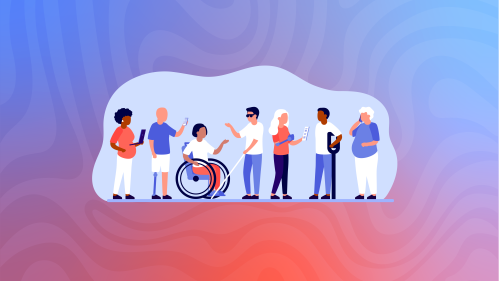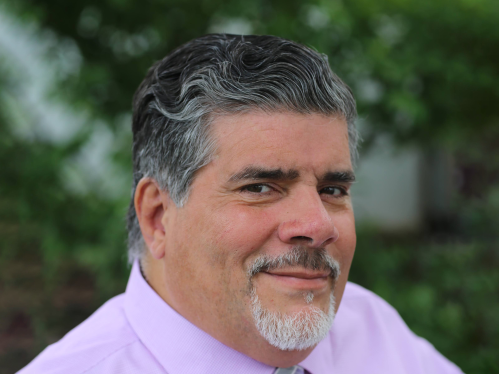
Rethinking Our Understanding of Disabilities
In recognition of National Disability Employment Awareness Month we invited members of the Rutgers community to reflect on the ways disability has touched their lives, the importance of solidarity and ways the world can improve for those affected by disabilities. Here is what they had to say.
Javier Robles
Director of the Center for Disability Sports, Health and Wellness
Department of Kinesiology and Health
School of Arts and Sciences
Rutgers-New Brunswick
I often begin one of my class lectures by introducing the definition of "disability."
The dictionary defines disability “as a physical, mental, cognitive, or developmental condition that impairs, interferes with, or limits a person's ability to engage in certain tasks or actions or participate in typical daily activities and interactions.’’
It uses terms such as disqualification, restriction, or disadvantage.
I break the definition down into individual sections highlighted in different colors and ask, what does this definition mean? It often takes a few minutes, but they get it. Those with disabilities are unable. They cannot individually or as a group achieve or overcome and the definition itself is tied to an economic value placed on them by society. Whether it is for Social Security benefits, veteran’s benefits, or other programs, the definition is suggested, but only as it relates to a monetary value assigned to a person with a disability. How much is their monthly worth based on a formula of disability severity?
Why isn't there a positive or realistic definition of disability?
I challenge you to find a definition that says:
Disability: a person who notwithstanding the social, political, economic and systemic barriers they are faced with can be contributing members of society, who are; parents, employees and employers, siblings, friends, learners, and teachers, athletes, and homemakers. While this definition does not encompass everything, I would like to say it begins a conversation.
This October, Rutgers University celebrates Disability Awareness Month, a time where our students, faculty, staff and New Jersey communities have an opportunity to learn, discuss and teach on many different topics, including ableism, history, sports, and laws, just to name a few. The official Disability Studies minor in New Brunswick is also kicked off as a new option for students. As a person with a disability, this gives me hope that we are moving in the right direction, toward greater equity and education for our students, with and without disabilities. The knowledge we impart on those who graduate the university should be inclusive and not cherry-picked, and these steps begin with us.
Why is this important?
The history of people with disabilities is everyone's history. Yet, it is not something we teach in high school. Unless a student takes a specific class, this may be something one never learns about. In order to rewrite the definition of what it means to be a disabled person, including intersections like poverty, gender, race and ethnicity, we must address the serious issue of a history that sought the destruction and sterilization of people with disabilities, people of color, women and the poor.
We are blind to our future if we do not see the past. I encourage all of us to use this month to learn about the stories that today shape our understanding of the word "disability."

Park McArthur
Tepper Family Endowed Chair in Visual Arts
Department of Art and Design
Mason Gross School of the Arts
Rutgers-New Brunswick
Disability is a consistently instructive force in my life, teaching me about everything from the nature of love to the imperative of humor. What I've learned from disability is creativity, finding connections across distance and isolation, intergenerational knowledge and care.
People living with chronic illnesses and disabilities engage in and share all kinds of everyday research for flourishing and surviving both in and outside of school. As part of the Mason Gross School of Art’s Department of Art and Design one of the things I find most exciting about teaching art is its experimental relationship to research. For example, this semester my partner, the artist Jason Hirata and I are teaching a new online graduate seminar on beds: both as subjects of art history and as spaces of creativity.
I would like to share this short, accessible, artwork/experiment of going to the beach through description and imagination because it, in many ways, exemplifies my artistic research and shares what I've learned from disability. It’s titled Day, 2023.

Jennifer A. Senick
Senior Executive Director of the Center for Urban Policy Research
Member of the Children's Specialized Hospital Board of Trustees
Edward J. Bloustein School of Planning and Public Policy
Rutgers-New Brunswick
It seems like yesterday that my son Julian was born, at 29 weeks weighing 6 lbs. He gained strength, weight and many acquaintances as family and friends (including Rutgers colleagues) came to visit him during his 100+ days in the St. Peter’s University Hospital NICU. Although it was not detected at the time, Julian was subsequently diagnosed with Cerebral Palsy, spastic diplegia. According to the CDC, CP is the most common motor disability in childhood caused by abnormal brain development or damage to the developing brain that affects muscle control. Spastic diplegia means that Julian’s CP mainly affects his legs, making walking difficult.
What has it meant to be at Rutgers while raising a disabled child?
First it means stable health insurance. Full stop. That can’t be underestimated.
Next it means navigating the world with a changed focus. I immediately notice ramps on the side of buildings with steps. I look for push-plates that my son’s service dog can push to open doors. And it means people.
Like Paul Fishbach, the associate director of recreation at Rutgers, who organizes hundreds of students to volunteer with kids like my son at Special Friends Day, the annual day of dizzying fun for special needs youth ages 6-21 held at the Cook/Douglass Recreation Center.
Or kind, anonymous people on campus who hold open doors or wait in elevators.
And there’s Pat Bisile, a contractor, who oversees parking for soccer games at Yurcak Field and can always find an extra space in the paved lot for us when most cars are shunted to inaccessible grassy field parking which on football gamedays is known as the blue lot.
There are heartbreaks on campus, like the 1872 Geology Museum, the oldest in the U.S., founded by Rutgers professor and state geologist George H. Cook, that still lacks an elevator and houses most public collections up steep, treacherous stairs on the second floor and more on the even worse narrow gallery above.
But for every lump of coal there are a dozen glittering gemstones among faculty and staff that have included me and my family in their dazzling disability advocacy.
The dance department has shown us the way to movement acceptance and physical understanding from the guidance of professors Jeff Friedman and Julia M. Ritter (now dean of the Kaufman School of Dance at the University of Southern California).
And no one has meant more to my son than Javier Robles, the director of the Center for Disability Sports, Health and Wellness in the Department of Kinesiology and Health.
They are role models for my son. He can see himself in others who are successful and creative.
Over the past several years I have also collaborated with an academically and otherwise diverse group of faculty, staff and students to establish the new Disability Studies minor. Housed at the Bloustein School, the Disability Studies minor examines the meaning, nature, and consequences of disability, as a social, cultural, and political construct.
I have lived the ethos of the disability studies minor as a mom of a disabled son where I have struggled with access and acceptance but also celebrated a diversity that I never saw like I do now.
Rutgers is an incredibly powerful organization that has led many glorious changes. It can do so with disability rights, too, by being an advocate and exemplar on campus and beyond. It can change the university’s host communities and the State of New Jersey and more. It can develop compelling research, emboldened students and a galvanized society with inspiring examples and bold action to change disabilities as we know them.

Nimit Kaur
School of Social Work, Class of 2023
Camden College of Arts and Sciences, Class of 2019
Disability Services Coordinator, Camden County Health Department
Rutgers-Camden
My early educational journey began within the confines of a special boarding school for the visually impaired in India. Here, I gained invaluable skills for navigating life with blindness, most notably, proficiency in Braille. However, my exposure to mainstream educational opportunities was limited. It was the unwavering support of my family, dedicated teachers, and knowledgeable professionals that guided me through the difficulties of my school education.
My early experiences encouraged a passion for disability advocacy within me. It was my enrollment at Rutgers University-Camden that marked a pivotal connection in my journey, where my enthusiasm for advocacy was further nurtured. The unwavering support of the scholarly faculty, dedicated staff, and committed disability services professionals during my pursuit of a bachelor’s degree in sociology and a subsequent master’s degree in social work at Rutgers was truly transformative.
Rutgers boasts a diverse and accomplished faculty and staff who are not only willing but eager to help their students forge connections that extend far beyond the classroom. I consider myself immensely fortunate to have engaged with a few professors during their office hours, who played a crucial role in advancing my educational and vocational aspirations through their profound insights.
Moreover, Rutgers Access and Disability Resources stand as a testament to the institution's unwavering commitment to ensuring equitable access to accessible classroom materials. These dedicated professionals go above and beyond to guarantee that students, regardless of their unique needs, have the same level of access to educational resources as everyone else. The disability services office at Rutgers-Camden played a pivotal role in honing my advocacy skills and addressing challenges encountered during my internships. They also played a critical role in fostering collaboration with the career center to ensure that students with disabilities enjoy equal access to career development services.
It is imperative to recognize that access to information and education is not merely a privilege but a fundamental human right, essential for making well-informed decisions. The removal of environmental barriers with collaboration of people with disabilities is the path to genuine inclusion. Encouraged by the unwavering support I received from Rutgers' staff, faculty, and professionals, I am determined in my commitment to giving back to the constituents I now serve in my current role. My aim is to work collaboratively with them to advance equity and inclusion in every aspect of their lives.





Produced by Evie Duvert. Photography by Ronald Downes Jr./Rutgers University.